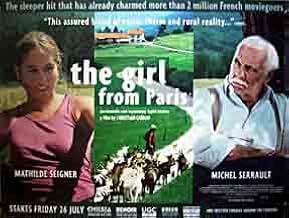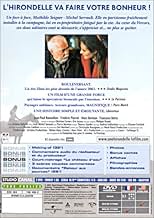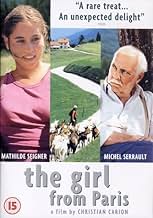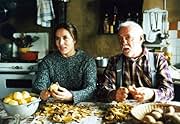Une hirondelle a fait le printemps
- 2001
- Tous publics
- 1h 43min
Ajouter une intrigue dans votre langueSandrine, a woman in her thirties gets tired of life in Paris and decides to leave her work in computers and become a farmer. She takes the required practice for two years, and after that sh... Tout lireSandrine, a woman in her thirties gets tired of life in Paris and decides to leave her work in computers and become a farmer. She takes the required practice for two years, and after that she buys an isolated farm from Adrien, an old farmer who decides it's time to retire. Howeve... Tout lireSandrine, a woman in her thirties gets tired of life in Paris and decides to leave her work in computers and become a farmer. She takes the required practice for two years, and after that she buys an isolated farm from Adrien, an old farmer who decides it's time to retire. However, Adrien wants to stay a few more months before moving away from the farm, and the rough ... Tout lire
- Réalisation
- Scénario
- Casting principal
- Récompenses
- 3 victoires et 2 nominations au total
Avis à la une
Sandrine buys a farm high on the Vercors plateau in South-East France from Adrien, an old peasant suspicious of Sandrine's college ideas. It's spring and Sandrine makes a good start, developing other aspects of the farm, a rural Gite welcomes travellers and school parties and a Web sites advertises goat's cheese.
Although the locals are suspicious they are perhaps more accepting of a young, dynamic outsider free of the petty local rivalries that set family against family in these close knit rural communities. This is no Jean de Florette and is illustrated when Adrien defends the changes Sandrine has made to his mates in the village bar.
However the rural idyll is not all that it might seem to city folk. The audience is confronted with graphic scenes of a pig having its throat cut to make Boudin (black pudding) and later of mad cows being killed with a bolt gun. Winter comes and the sense of despair and isolation felt by many small farmers is complete when we see Sandrine in long shot, alone in the barn after one of her goats has stillborn kids.
The film explores the conflicts between conformable but ultimately pointless city life - going nowhere in the Paris traffic and the savage beauty of life on the isolated Vercors plateau. Even the peasants shop at the local hypermarket in Grenoble.
Adrien's initial scepticism gives way to a hope that Sandrine will carry on his farm but he has difficulty with the rapprochement, perhaps caused by events in his own life. The Nazis burned his farm in '44 looking for maquisards and later Government men arrive to kill and burn his cattle infected with mad cow disease. Are the government men worse than the Germans? For Adrien maybe, as these events lead to the death of his wife.
Like the Vercors, Sandrine seems both beautiful but uncompromising but we see constant flashes of the temperament that, like the weather vane in front of her house, cause her to make sudden changes affecting those around her. She is really quite vulnerable needing the occasional love of her city boyfriend and the friendship of Adrien. Maybe it is this qualities that will lead to her eventual success?
A final comment, like many movies these days there is quite a bit of product placement - Volvo cars, Lowe mountain gear, Carrefour but the countryside is wonderfully shot.
SPOILERS FOLLOW. Sandrine enrolls in a two year school to study farming. She is one of the better students and a hard worker. She finds a farm to buy in a beautiful hilly area somewhere between Paris and Grenoble, probably closer to Grenoble. The old owner had lost his wife some years back, and was just tired of farming, but he didn't look kindly upon "school" farmers, and wasn't very helpful at first. In fact it seemed like he wanted her to fail, even though he had contracted to remain living there for 18 months. But he slowly warmed up to her when he saw how kind she was, and how hard she worked. She converted one building into a hotel and advertised it over the internet as "Balconies in the Sky." She sold her goat cheese over the internet. She worked hard every day. Her business was good.
In a key scene during the cold winter, we see him causing a problem with her hotel's electricity, and we assume he is up to no good. But, what he wanted was for her to be near him, so without heat, he invited her to stay with him in the old guest bedroom. A few days later, he fixed the problem. They shared meals and conversation, and they even danced. Not long before, a sour old man, he now had a little joy in his life.
After a particularly hard winter, Sandrine had to take a break, went back to Paris, even taught two days of an internet class. She considered whether she should go back, and decided to. The movie ends with her leading the goats back to the barn in the spring.
Sandrine Dumez (Mathilde Seigner) lives in Paris where she slaves away at teaching computer science to students in tune with the age. She is attractive, successful, popular...and unhappy. She longs to fulfill the dreams of her childhood and become a farmer. Much against her doting mother's advice she enrolls in a school for agriculture and eventually graduates as one of the top students, winning the ability to buy a farm in the Rhone Alps. The snag: the elderly crusty owner Adrien (Michel Serrault), who wants to sell his farm yet maintain his idyllic country existence without the wear and tear of farming, refuses to move off his own property once the contract is signed for Sandrine to take over the land. Sandrine allows Adrien to stay, makes the farm not only succeed despite her novice status, but also adds a hotel ('The Balcony of the Sky') to enhance her income from her goat farm whose chief product is cheese. Encouraging the transition is the jovial neighbor Jean (Jean-Paul Roussillon) whose recent selling of his own farm allows him to travel around in his new Volvo with his trusty (and hilarious) dog Pharaoh. Jean warns Sandrine that when winter come Adrien will become a recluse (remembering the loss of his wife, the Nazi decimation of the French farms, his losses from mad cow disease in the past, etc), yet Sandrine persists - until the winter comes and all but defeats her optimism. Events bond Adrien and Sandrine more closely, so much so that when Sandrine returns to Paris for a much-needed breather - and liaison with her ex-boyfriend Gérard (Frédéric Pierrot) - Adrien discovers how important to him Sandrine has become. The ending is tied into a surprise that touchingly resolves many doubts and questions and allows the viewer to finish the story on his own! The cast is superb, with special kudos to Michel Serrault, a consummate actor. The cinematography of the glorious farm location is by Antoine Héberlé and the very French musical score is by Philippe Rombi. The film is a delight in every aspect and one that deserves repeated viewings. Grady Harp
Le saviez-vous
- AnecdotesAt one point the farmers tie a bottle to a pear tree and stick a small branch with a blossom inside. They do this so, in a few months, the result will be a full sized pear inside the bottle, much too big to have been put into the bottle in the usual way. One of the farmers uses it to make a bottle of a pear flavored alcoholic drink, with the pear still inside, and the bottle, pear, and drink appear late in the film when the two farmers and Sandrine have a drink together.
- Gaffes1:10:30 - Sandrine enters the goat barn. She is not wearing a watch. Few seconds later she assists a goat that gives birth to a lamb. She then is wearing a watch on her left arm.
Meilleurs choix
- How long is The Girl from Paris?Alimenté par Alexa
Détails
- Date de sortie
- Pays d’origine
- Sites officiels
- Langue
- Aussi connu sous le nom de
- The Girl from Paris
- Lieux de tournage
- Sociétés de production
- Voir plus de crédits d'entreprise sur IMDbPro
Box-office
- Budget
- 25 000 000 F (estimé)
- Montant brut aux États-Unis et au Canada
- 183 266 $US
- Week-end de sortie aux États-Unis et au Canada
- 8 280 $US
- 23 mars 2003
- Montant brut mondial
- 12 812 396 $US
Contribuer à cette page























